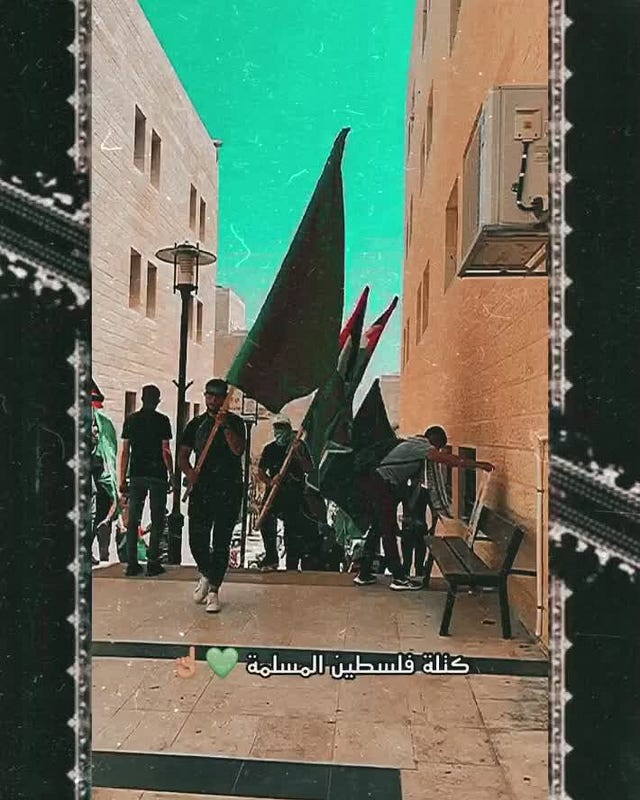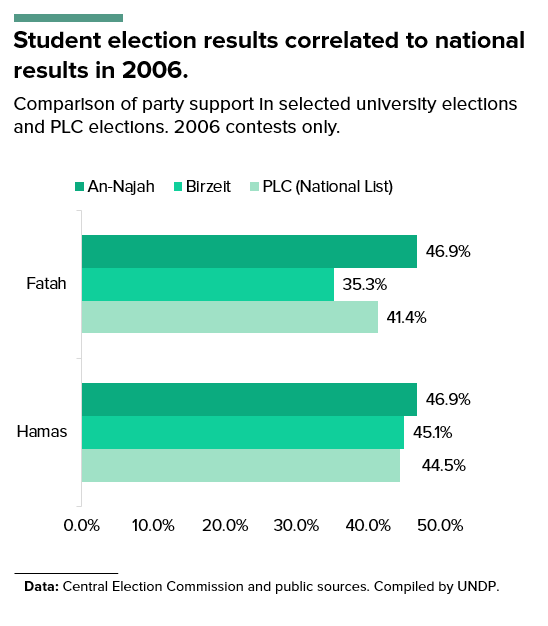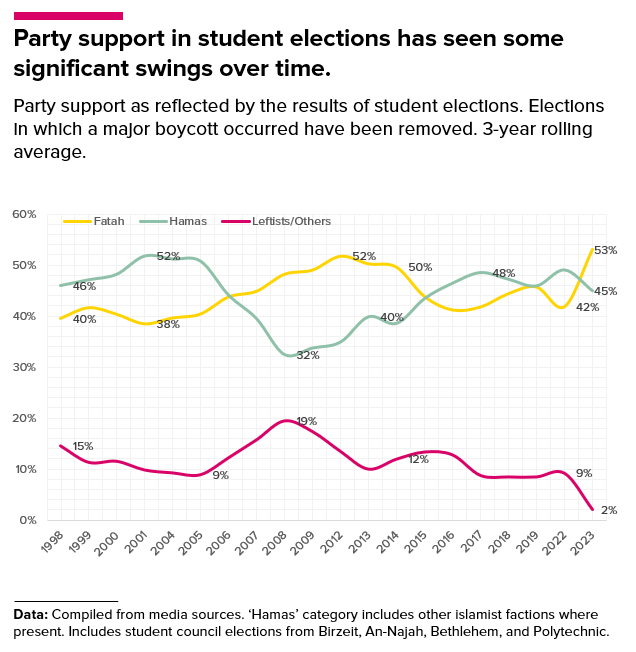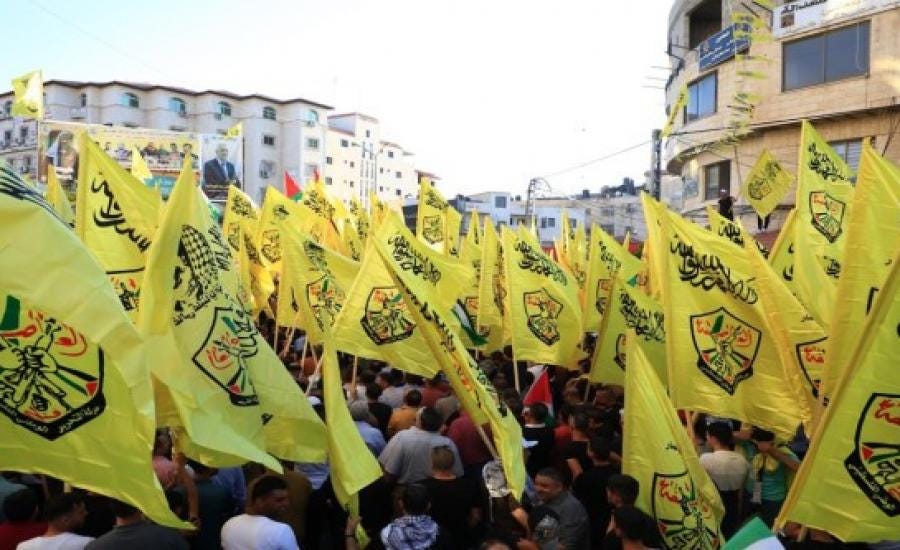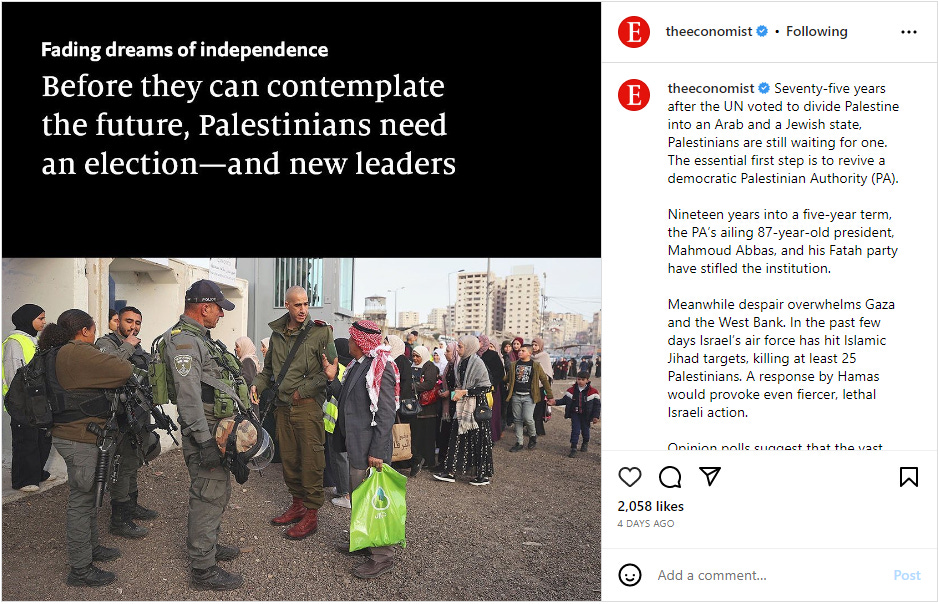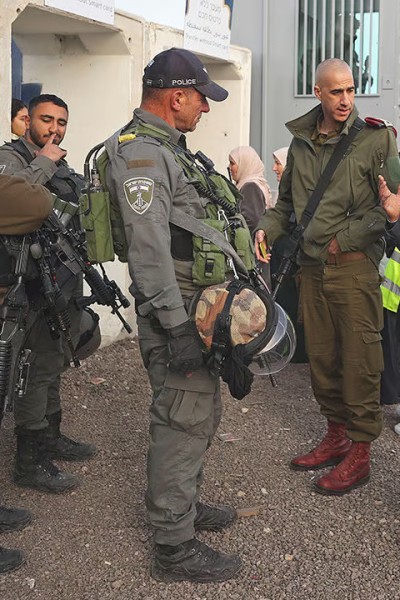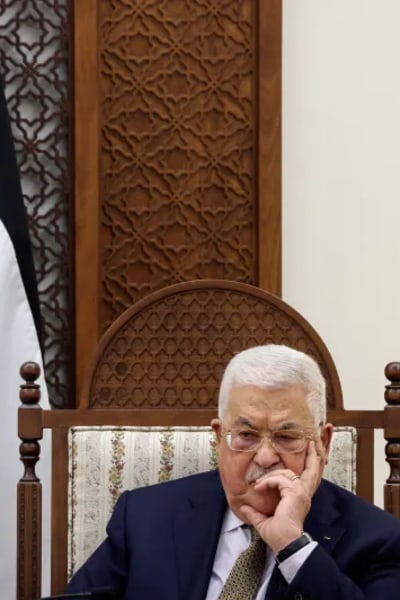The Weekly: What’s Going on in Student Council Elections?
An invitation-only newsletter of updates and insights on democracy & elections in Palestine, from the UNDP Democratization and Elections Project.
Hello,
Student council elections in the West Bank are quite unlike corresponding contests in consolidated democracies. This week we unpack these contentious elections: How they work, why they matter, and how to contextualize recent results.
In media updates, The Economist and Foreign Affairs published noteworthy articles on succession [PDFs at the end of this message].
Thanks for reading!
Understanding Student Elections.
There was a political upset in this week’s student elections at An-Najah, the West Bank’s largest university. A Hamas-affiliated list won a plurality (49%) of the seats, breaking Fatah-affiliated students’ five-round winning streak.
Student elections have deep saliency in Palestinian politics driven by three main reasons:
A proxy battle for national politics. With few venues for effective political competition in Palestine, the political and militant factions use student councils as proxy theatres for national standing.
A rough indication of party power. Trends in student election results could show some indication of what might happen in a national election. We’ll come back to this below.
A training ground for future political leaders. One of the reasons the theatre of student politics is seen as so influential is that Palestine’s most prominent political leaders have emerged from student politics: Yasser Arafat achieved prominence as the head of a now-defunct transnational student organization, the ‘General Union of Palestinian Students.’ Ismail Haniyeh, the political leader of Hamas, was the head of the student council at the Islamic University of Gaza. Marwan Barghouti, likely Palestine’s most popular politician, co-founded Fatah’s student organization.
Nonetheless, it’s easy to overstate the importance of student elections. The student population is unrepresentative of the national polity. It’s both younger and better educated than the national population. Students also have political preferences distinct from the national mean including being less socially conservative and more supportive of violent resistance.
Student elections may be indicative of national political trends. Student elections and national elections are alike to the extent that their outcomes are determined by national issues and the ability of factions and parties effectively to organize. Success in student elections may indicate the poignancy of a faction’s narrative and brand as well as a demonstration of its organizational capacity and ‘ground game.’
When we look back to 2006 (the last national elections), we find that some student election outcomes did correspond remarkably closely to the national vote (see chart above). Hamas’s performance in Birzeit and An-Najam’s 2006 student council elections closely matched their performance in the national list component of national legislative elections held in the same year (deviating by 0.6% and 2.5% respectively.) This contrasts favorably with the major public opinion polls which underrepresented Hamas support by an average of 18%:
Major polls were quite accurate in measuring support for the ruling party (+/- 4% on average), but pollsters struggled to measure support accurately for either Hamas (-18% on average) or other opposition parties (+ 20% on average). Exit polling, though more precise, was also inaccurate. [UNDP]
This could likely be a coincidence, and we shouldn’t assume that student polls would necessarily be an accurate prediction of national political outcomes in the future.
In student elections this year, Fatah has taken an average of 53% of seats, and Hamas (where it has competed) has taken an average of 45%. These numbers are wide of what our electoral support model suggests the probable range could be. These numbers have also swung significantly over time (see chart below).
How are student councils elected?
The electoral system for student councils is proportional and list-based (similar to that used for the PLC and the Knesset):
Members of the Student Councils are elected through Proportional Representation in a closed list system. This means that students vote with a single ballot for the electoral list (list of candidates) and not for the individual candidate. The rank order of the candidates on the list is determined when the list is registered. [IFES]
Because of the student body size, a few dozen votes can win a seat. The party with the largest vote share appoints the student council president, and forms a secretariat:
Following the election, the Student Council forms a Secretariat that consists of members plus the President of the Council. The winning electoral list assumes the right to form the Secretariat, either on its own (if the list won a majority of the votes) or through a coalition with other electoral lists. If the winning list fails to form the Secretariat within seven days, the seats of the Secretariat will be distributed proportionally according to the electoral results. [IFES]
The system is similar across universities, although the council magnitudes differ:
All West Bank universities follow a similar electoral system; however, the sizes of the Councils vary. An-Najah University, the largest in the West Bank, has an 81-member council. Al Quds University in Abu Dis has 61, Birzeit University 51, and Hebron University 41 seats. The universities of Bethlehem, Polytechnic, and American University in Jenin have 31 seats. [IFES]
The process is credible, if not always even-handed. Analysts differ on how free and fair these elections are: the polls are organized by the deans of the respective universities and a committee of teachers. Islamist lists and occasionally leftists have repeatedly boycotted some university elections on the grounds that they were rigged in favor of the ruling party. Birzeit University is usually recognized as holding the most transparent polls.
The factions invest significant resources into winning. Student organizers are often paid party employees. Some stay as ‘students’ in the universities for years longer than necessary for a degree. The party organizers are sometimes involved in vote-buying and patronage in the form of free transport or phone credit. Like local elections, there are reports of PA security and intelligence involvement as well as violence and intimidation.
What to watch for: Analysts will be closely watching the Birzeit University elections to see if the Islamist list returns, and by how big a margin. The ten-seat margin they received in 2002 may be an outlier, but they are likely to see an electoral benefit from the recent conflict between Islamic Jihad and Israel. Birzeit’s student body is seen to be the most representative of the West Bank in terms of regional representation and socio-economic diversity.
Media Updates
The Economist this week used the recent hostilities and the Nakba anniversary as a frame for reviewing the Palestinian condition. They conclude that democratic reforms including new leadership in the PA are the most probable way to re-integrate the Gaza Strip with the West Bank, and deal with the challenges of the conflict:
Opinion polls suggest that the vast majority of Palestinians want a true democracy. Some of the Western donors on whom the Palestinians rely have urged Mr Abbas to hold presidential and parliamentary elections that might bring Gaza and the West Bank back together under a single authority. It could rejuvenate its leadership and legitimise it, in the event of negotiations with Israel. Even Hamas, still ostracised as a terrorist organisation by most Western countries, has told diplomats it would accept a limit to the size of its representation in a new Palestinian parliament and would not bid for the presidency.
Indeed, elections might break the hold of both Hamas and Fatah over Palestinian politics. Opinion polls suggest that over 40% of voters—and a majority in the West Bank—want “none of the above”, preferring a pragmatic leadership to tackle the poverty and corruption currently winked at by what they see as brutal Israeli overlords. For the moment neither model—one state or two—looks remotely feasible. The essential first step before Palestinians can contemplate the distant future is to revive a democratic Palestinian Authority.
Ghaith Al-Omari writes in Foreign Affairs, that it’s not too late to avoid a succession crisis. Al-Omari argues that instead of a democratic process, Abbas should start a competitive process within the ruling party out of which a successor can emerge.
Have we gotten something wrong or missed an angle? please get in touch!
Is The Weekly landing in your promotions, junk, or spam folder? Just drag this message back to your regular inbox and email this address (that will let your email program know you trust us.)
Missed a previous edition? Check out our recent features on kinship politics, voting in East Jerusalem, and women in politics.

